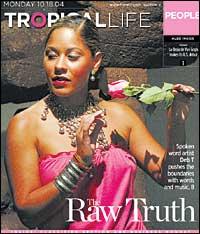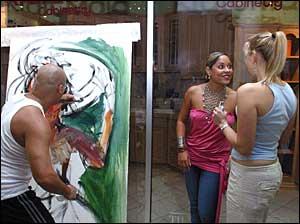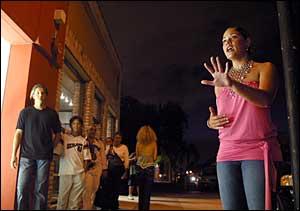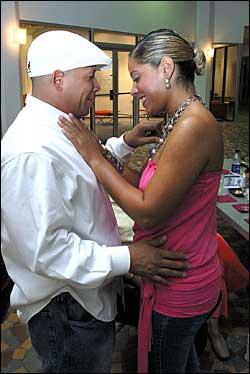|
 |
|
Esta página no está disponible en español. THE MIAMI HERALD The Raw Truth Spoken word artist Deb T pushes the boundaries with words and music. By LIZ BALMASEDA 18 October 2004
There, she did everything you're supposed to do if you want to be a working actress. She learned the lingo, slaved over auditions, networked, powerwalked, meditated, weaned herself away from the safe confines of her Miami hub. She worked on herself, inside and out. I remember the night she invited me to her ''movement class'' in Santa Monica. ''It's very soothing. You'll absolutely love it,'' she promised. I envisioned one of those experiences they describe in spa magazines, a relaxing evening of gentle, guided stretches in serene anonymity. A couple of hours later I was dodging a large, sweaty, hairy guy who barreled toward me in a loin cloth, his arms flung wide. The hot, cavernous room pulsated with night creatures bounding, crawling, hopping, jiggling, 'spressing themselves as they do ever so freely in Santa Monica. There was no instructor, no identifiable strain of music, no personal space. And yet there was my girl, Deb T, Deborah Magdalena Torres, Deb Dogg, Boricua morena, dancing dreamy-eyed, oblivious to the bodies that slithered around her. At one point she danced over to the corner where I stood. The hairy guy lurked in the shadows. "Just checkin' on ya, Ma,'' she said, ever in motion. __________ Deborah Magdalena Torres, aka Deb T, chats with Allison Goldberg at Coma's Cafe "I refuse to hug anybody, OK?'' "Just have a good time.'' With that, she disappeared into the madness for what seemed an eternity. Deborah tried her best to become an L.A. chick. I watched that process with some curiosity, having been tossed into that mirage myself. I considered myself lucky that I could come home after a few dizzying days in Cali and regenerate with some proper Miami calories and a good Heat fix. But Deb, she was braving the wilds by herself. Not only was she trying to adapt to the daily whims of an unforgiving industry, she also was trying to mend a broken heart, having recently ended a longtime relationship. She had a pretty nice resumé, which included bit roles in several motion pictures and a recurring role on the Aaron Spelling series Safe Harbor, but that didn't open many doors. Thank the gods for Shaquina. The experience would prove overwhelming. One day I sensed she hadn't been her chirpy self in a long while. She seemed embattled and exhausted. If she were rhyming on this, Deborah, born in Mayagüez, Puerto Rico, and raised in Flushing, Queens, might say something like:
Deb T draws a crowd as she makes an audition tape for HBO's 'Def Poetry Jam.' My East Coast soul declared war on my West Coast head/And they dueled every morning 'fore I got out of bed. Well, you get the idea. That tug-of-war worsened after one of her dear friends, a New York firefighter, disappeared in the World Trade Center inferno of Sept. 11, 2001. Deborah spent weeks in Queens, trying to comfort his fiancé, her closest childhood friend. But after she returned to her apartment in Los Angeles, it was Deborah who seemed inconsolable. She went to a psychic who offered some daunting advice: Write. Write everything. Write letters, as many as you need to. So Deborah poured all her emotions into a series of pages she would later call ''Letters to the Men I Love.'' These were long, rhetorical, intimate letters, addressed to her ex-boyfriend, her father, her brother, her ex-husband, ''celebrating, forgiving, thanking the relationship,'' as she puts it. ''I just needed to vent any way I could. There were no rules to my writing. I just put it down,'' she says in retrospect. Eleven handwritten pages later, she had her first spoken word series. She sought refuge in this new, often alien, flow of words. She came to see herself in a different light, less an interpreter than a creator. And she came to this realization: ``I can breathe without acting, but I can't breathe without writing.'' With that, she packed up and returned to Miami. She was broke, but relieved to be home. She decided it was time to approach some of those men she had written the letters to and share her newly explored feelings. Then she went home to her mom and asked her permission to perform them, for some of the pages contained the elder Torres' personal passages. That day, as she does several times daily, Provi Torres gave her daughter la bendición, her blessing. Deborah ventured out into Miami's budding spoken-word scene, watching the nightly lineup from the audience of dim, off-beat clubs. She didn't dare step on a stage with the other poets, not at first. Instead, she learned their names, listened to their rhymes, learned the culture and hierarchy of that universe. She'd get up early and write. At night she'd join the spoken word devotees. It didn't take long for them to learn her name and recognize the playful ring of her voice, barreling from the back of the club: ``Reee-wind!'' __________ Deborah takes a time out from her spoken-word gig at Coma's Cafe and Bakery Soon enough, she had a repertoire, one she felt comfortable enough reciting from the stage. Well, perhaps reciting isn't the best word to describe her dramatic, often raw delivery. But she certainly wasn't acting. The material was too personal for that. Her early pieces were angry, often tirades linked with expletives. One night, after sitting through several similarly peppered spoken-word performances by similarly angry artists, I had to ask her, in confidence, why it was that everybody used the same bleeping words in every bleeping poem when there were so many other, great bleeping words in the bleeping dictionary that inarguably would convey their bleeping messages with far more bleeping power. ''What? Reee-wind!'' she hollered. In time, her writing dug deeper, exploring not only anger, but also the mysteries of love. She began to have fun with her new craft. But she also realized it was just that, a craft that wasn't paying the bills. She got a day job at a development firm, all but obliterating the luxury of proper writing time. On the bright side, her days weren't governed by TV pilot season. She pressed ahead with her newfound vision of herself as a spoken word artist. She put together a CD, titled Spoken Soul: A Survival Kit of Poetry. She worked on her website, deborahmagdalenacom, and she began hosting poetry events and other gigs. During one special summer showcase at the Marlin Hotel on South Beach, she performed her works accompanied by her pianist father, Nestor Torres, and her brother, the famous flautist of the same name. ''My poetry is a little different. It's musical. I guess I've tried to create a niche for myself. I'm not a vocalist and I'm not a pure poet. I'm very conscious of the music around me. I hear my poems musically,'' she tells me over dinner one night. Earlier this year, a visiting friend from L.A. caught her set at a poetry night at the Jade club on South Beach. He knew Deborah from her actress days. He didn't recognize the woman he saw on stage, delivering raw, emotion-packed riffs. The way she commanded the room stunned him. Deborah had found her truth and she was speaking it. She had looked inside and discovered the essence she had searched for as an actress. ''As an actress, you live somebody else's moment. I know I'm a better actress and performer now because I'm in tune with living in my moment,'' she says. She lets the thought sink in. Then a flicker lights up her eyes. 'Ooh, Ma, I feel a poem comin' on.''
|

 Deb T fell for the Hollywood promises of movie roles and stardom. She packed up her Eleggua, her good luck cross, her press kit, and her white Manchester terrier, Shaquina, and she left Miami for the City of Angels.
Deb T fell for the Hollywood promises of movie roles and stardom. She packed up her Eleggua, her good luck cross, her press kit, and her white Manchester terrier, Shaquina, and she left Miami for the City of Angels.
 __________
__________